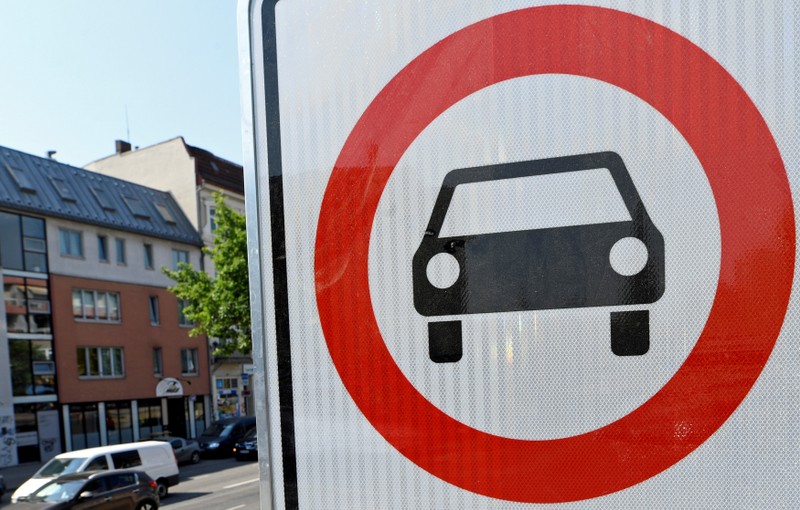
FILE PHOTO: A traffic sign, which ban diesel cars is pictured at the Max-Brauer Allee in downtown Hamburg, Germany, May 31, 2018. REUTERS/Fabian Bimmer/File Photo
October 2, 2018
By Holger Hansen
BERLIN (Reuters) – Owners of older diesel cars in German cities where the air is particularly polluted should be able to choose between trade-in incentives and a hardware upgrade, coalition parties have agreed according to a paper seen by Reuters on Tuesday.
After marathon talks, Chancellor Angela Merkel and leaders of her coalition partners announced in the early hours they had agreed on a way to cut pollution in cities while avoiding unpopular driving bans.
The document, seen ahead of an official announcement of the deal, said German carmakers had agreed to offer an exchange program with attractive trade-in incentives or discounts for owners of diesel vehicles meeting the older Euro 4 and Euro 5 emissions standards. The current standard is Euro 6.
The coalition parties said in the document that the immediate introduction of such trade-in incentives for diesel vehicles could ensure that all affected drivers of the Euro 4 and 5 standard could get another vehicle before possible driving bans are introduced.
Germany’s big carmakers — Volkswagen <VOWG_p.DE>, Daimler <DAIGn.DE> and BMW <BMWG.DE> — had no immediate comment on the deal.
The coalition parties said they expected foreign carmakers to make similar offers to their customers.
France’s Renault <RENA.PA> said earlier on Tuesday it was offering owners of older diesel vehicles in Germany incentives of up to 10,000 euros to trade in their cars for newer ones.
Sweden’s Volvo had said on Monday it could also consider offering incentives, but that it was not considering any hardware retrofits for diesel vehicles in Germany.
COSTLY FIX
The coalition document said that if owners of a Euro 5 model wanted a hardware retrofit with a so-called selective catalytic reduction (SCR) system and if this was available and appropriate, the German government expects the carmakers to shoulder the costs.
On delivery vehicles and trade vans, the government would subsidize hardware retrofits with SCR systems by up to 80 percent, the document said.
There are 3.1 million diesel cars running to the Euro 4 standard, and 5.7 million Euro 5 diesels, out of a total of 46.5 million cars on the roads in Germany, according to figures from the German KBA transport authority.
Using a benchmark of 2,400 euros ($2,760) per car that Volkswagen has agreed to cover for diesel car retrofits, this could cost the industry up to 13.7 billion euros, excluding the 1.29 million commercial Euro 5 vehicles that are on German streets.
Volkswagen’s <VOWG_p.DE> admission in 2015 that it cheated U.S. diesel emissions tests led to the discovery that diesel vehicles from several manufacturers routinely exceeded pollution limits in normal driving conditions, prompting a regulatory crackdown.
At the same time, the German courts have paved the way for city driving bans to tackle levels of nitrogen oxide that exceed European safety levels.
The city of Hamburg banned older diesels from two of its roads in May, and a ban in Frankfurt, the financial capital, is due to take effect next February.
($1 = 0.8684 euros)
(Additional reporting by Douglas Busvine; Writing by Michelle Martin and Madeline Chambers; Editing by Maria Sheahan/Keith Weir)

